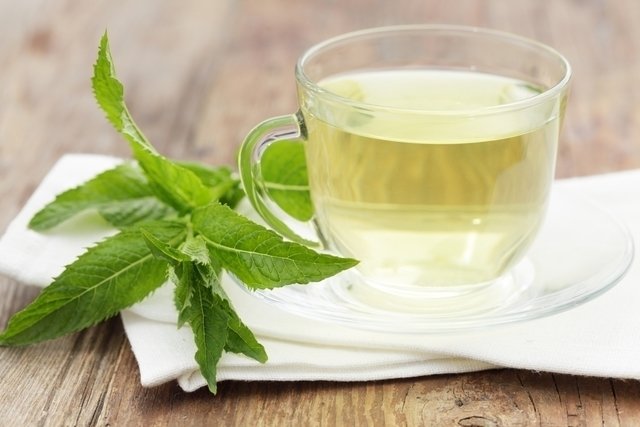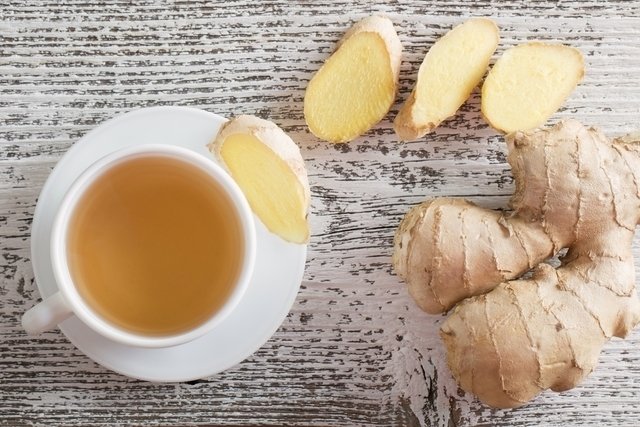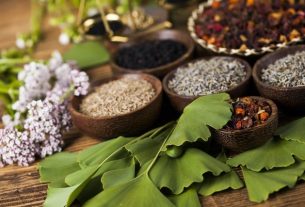Home remedies for food poisoning, such as ginger tea, fennel tea, homemade serum or coconut water, replace mineral salts and water and have antiemetic, antispasmodic and analgesic actions, helping to alleviate symptoms such as nausea, vomiting or diarrhea, in addition to to help prevent dehydration.
Food poisoning is caused by the ingestion of food contaminated with toxins produced by bacteria or fungi and whose symptoms appear a few hours after consuming the food. Treatment for food poisoning must be done to prevent worsening of symptoms and dehydration and must include, in addition to home remedies, a light diet, rest and increased water intake.
Home remedies can be used to alleviate the symptoms of food poisoning, but if there is no improvement within 2 days, it is advisable to consult a doctor so that treatment with medication can be started, if necessary. Know how to recognize the symptoms of food poisoning and how to treat it.

1. Homemade serum
Homemade serum is a great option for a home remedy for food poisoning, as it is rich in mineral salts and sugar, which keeps the body functioning and prevents dehydration that can occur due to vomiting and diarrhea.
2. Coconut water
Coconut water is also a good home remedy for food poisoning, as it is rich in vitamins and minerals, and helps to hydrate the body, replacing nutrients and fluids lost due to vomiting and diarrhea and helping the body to recover more quickly. .
Coconut water can be consumed freely, however, to avoid the risk of vomiting, it is recommended to drink natural cold coconut water.
3. Ginger tea
Ginger tea is rich in phenolic compounds such as gingerol and chogaol, which have antiemetic action, helping to reduce nausea and vomiting, as well as improving the symptoms of heartburn and poor digestion, making it a great option to treat these symptoms caused by intoxication. to feed.
Ingredients
- 2 cm of ginger root;
- 1 cup of water.
Preparation mode
Peel the ginger slices and cut into smaller pieces. Add the ginger to a pan, add the water and let it boil for 5 minutes. Let cool, strain and drink up to 3 cups of tea per day.
Ginger tea should be avoided by people who use anticoagulants such as warfarin or aspirin as it may increase the risk of bleeding or hemorrhaging. Furthermore, women who are pregnant, close to giving birth or have a history of miscarriage, clotting problems or are at risk of bleeding should avoid using this tea.
4. Peppermint tea
Peppermint tea is a good home remedy option for food poisoning as it has essential oils in its composition, such as menthol, menthone and limonene, which have analgesic and antispasmodic action, helping to relax the intestinal muscles, reducing the formation of gases, which reduces the contractions that cause diarrhea and intestinal colic.
Furthermore, this tea, as it has antispasmodic action, helps to alleviate the symptoms of nausea and vomiting caused by food poisoning.
Ingredients
- 2 to 3 tablespoons of fresh, dried or crushed peppermint leaves;
- 150 mL of boiling water.
Preparation mode
Place the peppermint leaves in a teacup and fill with boiling water. Let it rest for 5 to 7 minutes and strain. This tea should be drunk 3 to 4 times a day.
5. Fennel tea
Fennel tea has anethole, ursol and camphor in its composition, with antispasmodic, anti-inflammatory, analgesic and digestive action, making it an excellent option for a home remedy to reduce colic, gas, diarrhea, nausea and vomiting caused by by food poisoning.
Ingredients
- 1 spoon of fennel seeds;
- 1 cup of boiling water.
Preparation mode
Add the fennel seeds to the cup of boiling water. Cover and let it cool for 10 to 15 minutes. Strain and drink 2 to 3 cups a day. Another option for preparing this tea is to use a fennel tea bag.
Fennel tea should not be used by pregnant or breastfeeding women.
6. Apple cider vinegar
Apple cider vinegar has antiviral and antimicrobial properties, in addition to helping to restore the bacterial flora in the intestine, making it an excellent home remedy option to treat diarrhea and intestinal colic caused by food poisoning.
Additionally, apple cider vinegar also helps relieve nausea and stomach pain.
Ingredients
- 1 to 2 tablespoons of apple cider vinegar
- 1 glass of filtered water.
Preparation mode
Dilute apple cider vinegar in a glass of water and drink on an empty stomach, up to 3 times a day during the first 24 hours of food poisoning. After this period, you can drink 1 glass of this mixture once in the morning and again in the evening to avoid diarrhea.
It is important to rinse your mouth with water after drinking the apple cider vinegar solution and, to prevent tooth enamel from wearing away, you should brush your teeth 30 minutes after drinking the apple cider vinegar solution.
Apple cider vinegar should not be consumed by anyone allergic to apple cider vinegar or by people undergoing treatment with digoxin or diuretics such as furosemide or hydrochlorothiazide, for example, as they can reduce potassium levels in the blood and cause muscle weakness, cramps , paralysis or cardiac arrhythmia.
7. Chamomile tea
Chamomile tea is another option to alleviate the symptoms of food poisoning, as it has digestive and anti-inflammatory properties that help reduce abdominal cramps, acidity, nausea, dizziness and gas.
Ingredients
- 1 teaspoon of dried chamomile flowers;
- 1 cup of boiling water.
Preparation mode
Place the chamomile flowers in the boiled water, cover and let it rest for 5 to 10 minutes. Then strain and drink up to 3 cups per day.

Sign up for our newsletter and stay up to date with exclusive news
that can transform your routine!
Warning: Undefined array key "title" in /home/storelat/public_html/wp-content/plugins/link-whisper-premium/templates/frontend/related-posts.php on line 12
Warning: Undefined array key "title_tag" in /home/storelat/public_html/wp-content/plugins/link-whisper-premium/templates/frontend/related-posts.php on line 13




